The Water March that set off from Cajamarca on February 1, 2012, continues on. After a warm welcome [es] in La Libertad region and more support [es] from farmers, fishermen and ecologists [es] on passing through Ancash, the March is now approaching Lima.
Meanwhile, various independent journalists and foreign websites are talking about and giving their opinions about the March. For example, El Ciudadano [es], PiensaChile [es] and Mapu Express [es] of Chile, the Agencia Latinoamericana de Información [es], Rebelión [es], Infolatam [es] are all reporting on the March. In Lima, however, some media are revealing [es] alleged political reports that denounce the March organisers as “reds and extremists” and “experts in the mobilisation of masses”.
The following video, uploaded to YouTube by noenhucal on February 5, captures the beginning of the March in the village of Santa, a little before Chimbote.
In the previous post we left the March on its fifth day, leaving [es] Chimbote and headed for [es] the city of Casma and then on to Huarmey. From there they continued on [es] to Paramonga, which now belongs to the Lima region, where they spent the night. On the Chungo y Batán blog they repost photos [es] of the march through Trujillo and Chimbote, as well as the arrival in Casma on Sunday night.
Al promediar las 8 de la noche, llegaron a la provincia de Casma, conocida como la ciudad del eterno sol, hasta cerca de la media noche realizamos una manifestación cultural, también agradeciendo al alcalde que recibió a los marchantes. Al cierre de la presente edición, nos preparamos para salir marchando hasta Paramonga.
At around 8 o'clock in the evening, they arrived in the province of Casma, known as the city of eternal sun. Until about midnight we held a cultural protest and thanked the Mayor for receiving the marchers. On ending this post we are preparing our march to Paramonga.
La Misión de Observación (The Observation Mission) issued [es] their report on the fifth day in which they announced, among other things, the motives of the various Ancash collectives that have supported the March:
Almenzor Gómez y Javier Castro, representando a cientos de pescadores de la provincia de Chimbote, explicaron que ven amenazado su trabajo y la biodiversidad de su costa por la inminente presencia de la petrolera Savia Perú (ex –Petrotech) que pretende levantar una plataforma a 20 millas de Chimbote. […] Por su parte, Javier Castro, […] se refirió al gran riesgo que correría el zócalo marino de Áncash, rico en nutrientes y pesca, si se produjera un derrame de petróleo. Los ancashinos concretaron 4 reivindicaciones centrales por las que se unen a la Marcha: intangibilidad de cabeceras de cuenca, prohibición de la minería con cianuro y mercurio, derecho a la consulta de los pueblos y declarar el agua un derecho constitucional.
After staying overnight [es] in Paramonga, the March set off for Pativilca, Barranca and Supe, where the day ended [es]. In the blog Frente de Defensa Ambiental de Cajamarca (Cajamarca Environmental Defence Front) there is a report [es] with photos.
The Observation Mission issued its report of the day in which it identifies [es] certain problems related to the March that we have mentioned in previous posts.
En torno al rosario de problemas sociales y ambientales, con sus correspondientes conflictos, que van federándose en torno a la Marcha del Agua, la Misión de Observación toma nota de la denuncia de una campaña de descrédito, según los organizadores, con acusaciones de “politización interesada de la Marcha” e incluso “connivencia terrorista de sus dirigentes”; recientemente viene apareciendo la acusación de que “Chile financia la Marcha”, para que las empresas se vayan allá … Los portavoces de la Marcha insistieron en que su objetivo es poner en la agenda nacional la prioridad del derecho al agua desde la movilización no violenta.
From Supe the marchers headed for Huaura and then [es] to Huacho, the city where they spent the night. Holding [es] a meeting the next day and spreading its proposals through the city streets. Earlier, in the city of Barranca, the members of the Observation Mission and the Water March met. The Mission's report [es] on the day talks about this meeting, highlighting the motives for the March as explained by its organisers:
Jorge Spelucín, maestro, e integrante de la Comisión Nacional del Agua, suscitó la denuncia del largo proceso de criminalización que los distintos dirigentes sufren, “no queremos que continúe la criminalización de la protesta que impuso el anterior gobierno, los pobres hemos soportado por 20 años la violencia política y social de Yanacocha”, dijo.
On February 8 DLOOCHI uploaded the following YouTube video about the Water March in Huacho:
Meanwhile in Lima the March's sympathisers are already preparing to receive them on Thursday, February 9. The organisers that live in the city are meeting to prepare different activities like “Foro Hídrico: Agua, Minería y Desarrollo en el Perú” [es] (Water Forum: Water, Mining and Development in Perú) that begun on February 8 (here you can access its programme [es]) and the Tribunal Nacional de Justicia Hídrica [es] (National Water Justice Tribunal). “Voluntary work for reception, food, adjustment and National Great Water March marcher registration logistics” have also been announced [es] and organised [es] for their arrival in Lima. The Great Water March blog posts [es]the marching route for Lima and on the Seamos Un Río blog they ask for [es] donations:
Este esfuerzo [la marcha] se está realizando de manera autogestionada y autofinanciada, por lo que nos vemos en la necesidad de apelar a su solidaridad y animo de lucha para ayudarnos a cumplir con las metas trazadas durante los 3 días que nuestros compañeros caminantes de la Gran Marcha Nacional del Agua permanecerán en la ciudad de Lima.
El presupuesto que estamos manejando son para la realizacion de las siguientes actividades: **Albergue y Tribunal Hídrico**, **Foro Hídrico**, **Acto Político Cultural**, **Marcha**, **Comunicación, movilidad**
This effort [the March] is self-managed and self-financed. We see the need to call on your solidarity and to encourage the struggle to help us to achieve the goals that were drawn up during the three days that our fellow marchers on the National Great Water March stayed in the city of Lima.
The proposal that we are managing is for the execution of the follwoing activites: **Hostal and Water Tribunal**, **Water Forum**, **Political Culture Act**, **March**, **Communication mobility**
Freddy Otárola, the Nationalists congressman, has recently issued a controversial statement. He said [es]: “We hope that the ‘Water March’ will be a failure”. The Prime-minister, Óscar Valdés, hopes [es] that the “March for water” will show a techincal stance rather than a political one. In the meantime from the city of Puno they have announced [es] that the representatives of the struggle committes and the defence fronts of the regions of Puno, Cusco, Arequipa, Madre de Dios, Moquegua and Tacna, will carry out a march and a protest in support of the Water March.
Finally, in this video filmed in the Fórum Social Mundial [pt] (World Social Forum), held in Porto Alegre, Brazil, between January 24 and 29, they have put together some testimonies and messages from participants expressing their support and solidarity with the Water March.

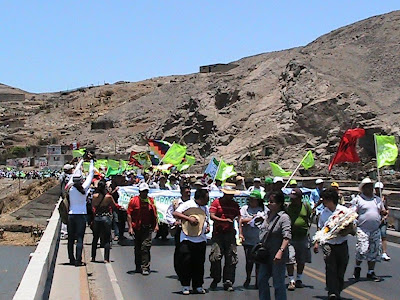
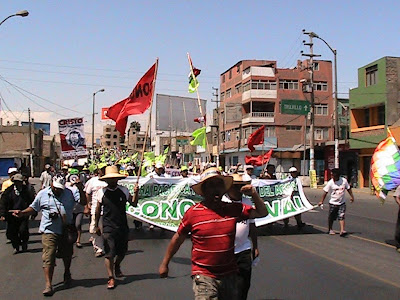
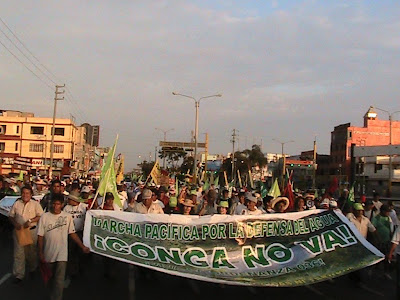
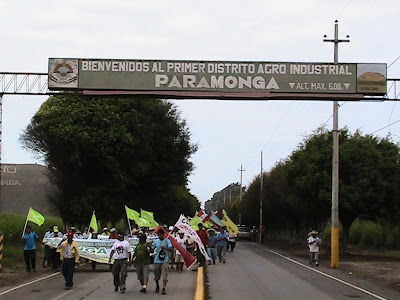
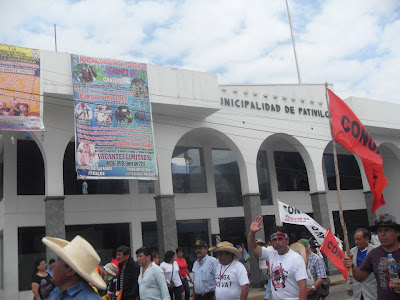






1 comment